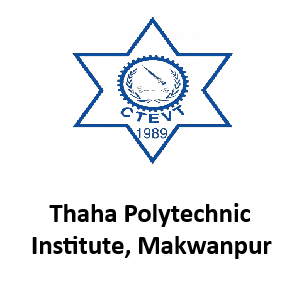Overview
Diploma in Mechanical Engineering at Nepal Bharat Maitri Polytechnic Institute
Nepal Bharat Polytechnic Institute (NBPI) 's Diploma in Mechanical Engineering, offered in Hetauda-6, Gauritar, Makwanpur, is a three-year program focused on practical skills and job-oriented learning. Established in 1998 AD as a part of the Council for Technical Education and Vocational Training (CTEVT), NBPI provides this program to develop mechanical technicians who can work in various technical and industrial fields within Nepal and abroad.
Curriculum Structure
The program follows the curriculum approved by CTEVT and lasts six semesters. It includes classroom learning and lab-based tasks to support the development of hands-on mechanical skills.
Key learning areas include:
-
Engineering drawing
-
Mechanical measurements
-
Workshop technology
-
Machine design
-
Energy systems
-
Fluid mechanics
-
Maintenance of mechanical systems
-
Production processes
-
Final project and field training
The final year emphasizes applied learning through on-site tasks and group-based projects.
Program Aim
The main aim is to support students in learning technical skills needed in the industrial and service sectors. The course helps learners gain knowledge of tools, machines, systems, and repair techniques used in everyday mechanical work.
Who This Course Is For
This course is designed for SEE graduates who want to enter the technical workforce. It suits individuals interested in working with machines, mechanical tools, or production equipment. It also serves those who wish to gain a strong foundation for further technical studies.
Practical Skills and Tools
Students gain direct experience with tools and machines used in actual workplaces. Some practical modules include:
-
Welding and sheet metal work
-
Lathe, drilling, and shaping machines
-
Pump and engine systems
-
Safety and handling of equipment
-
Workshop-based maintenance
-
Report writing and field documentation
Labs and workshops are regularly used to develop skills that match industry tasks.
Teaching Process
NBPI applies a practice-based learning model. Teaching includes:
-
Theory classes with visual support
-
Hands-on sessions in labs and workshops
-
Group discussions and practical assignments
-
Field visits and small group exercises
-
Demonstrations and guided experiments
Trainers support students step-by-step and ensure every lesson connects with future job roles.
Admission Requirements
To apply, students need to:
-
Pass the SEE with a GPA of at least 1.6
-
Have required grades in English, Science, and Mathematics
-
Or, hold a technical SLC in a relevant subject
-
Sit for and pass the CTEVT entrance exam
Documents needed include:
-
SEE or SLC mark sheet and character certificate
-
Citizenship or birth certificate
-
Two recent passport-size photographs
-
Relevant documents for those applying under quota categories
Career Areas
After completing the course, graduates may find roles in:
-
Machine servicing units
-
Mechanical repair workshops
-
Manufacturing plants
-
Construction sites and equipment handling
-
Industrial and power sectors
-
Local and international technical jobs
They may also apply to further diploma or bachelor-level programs.
Scholarship Options
NBPI provides different types of scholarships based on merit and category:
-
Merit-based full scholarship
-
Reserved quotas for women, Dalit, Janajati, Madhesi, Muslim, and students from remote regions.
-
Seats for conflict-affected and students with disabilities
-
Fee-paying seats for local residents, Makwanpur district applicants, and CTEVT-related applicants
Among 48 total seats, 4 are allocated as full scholarship seats.
Facilities for Students
NBPI supports student learning with facilities that include:
-
Mechanical labs and workshops
-
General classrooms and computer lab
-
Library and science lab
-
Hostel and cafeteria
-
Sports and recreational spaces
-
Counseling services and technical guidance
These resources contribute to a practical and learner-friendly environment.
Why Choose This Course
This diploma offers a practical path into technical employment. The teaching process, combined with affordable access and real-world training, makes it a solid option for students who want to gain useful skills across industries.
Conclusion
The Diploma in Mechanical Engineering at NBPI provides clear technical knowledge and work-ready skills. With structured lessons, skilled instructors, and access to tools and facilities, this program prepares students to enter the workforce directly or continue their education in related fields.


















